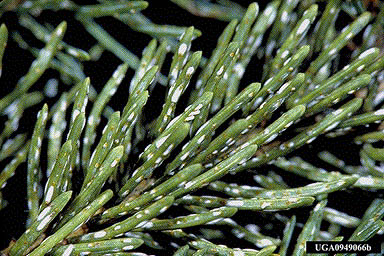Scale insects
Natural History

Scale infestation on pine needles
Photo credit: J. B. Hanson - USDA Forest Servic
Scale insects form a group of insects that vary widely in appearance and can affect both hardwoods and conifers.
There are three types of scales (softbodied, hard-bodied, or armored scale) and over 200 species can be found in Florida.
A large population of scales can cause stunted tree growth, a weakening of the tree, and branch or crown dieback. Scales are usually a serious problem only in nurseries, seed orchards, and landscape trees.
Scales go through three life stages: the egg, the nymph, and the adult. Many scales can only move about during the nymph stage, which is also called the crawler stage. As adults, these scales cannot move around a tree and stay in one place. Depending on the type of scales, adults usually have some form of outer covering, either a hard covering or a softer, waxy one.
In the spring, female scales lay their eggs underneath their bodies. The eggs hatch and the nymphs emerge and seek out a feeding site on the tree. Scales feed by sucking out plant juices and this is what causes damage. Nymphs eventually molt and become adult scales.
